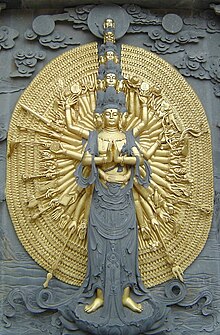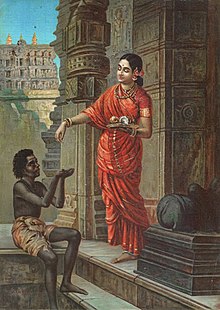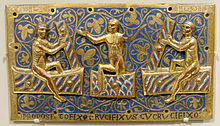Completeness

Completeness is the property of being whole, entire. In general, an object is complete if nothing needs to be added to it. This notion is made more specific in various fields. In logic, semantic completeness is the converse of soundness for formal systems. A formal system is "semantically complete" when all its tautologies are theorems, whereas a formal system is "sound" when all theorems are tautologies (that is, they are semantically valid formulas: formulas that are true under every interpretation of the language of the system that is consistent with the rules of the system). In Computational complexity theory a computational problem is complete for a complexity class if it is, in a technical sense, among the "hardest" (or "most expressive") problems in the complexity class.
- See also:
Quotes
[edit]

- Death not merely ends life, it also bestows upon it a silent completeness, snatched from the hazardous flux to which all things human are subject.
- Hannah Arendt, in Platonic Noise, p. 43.
- A home with a loving and loyal husband and wife is the supreme setting in which children can be reared in love and righteousness and in which the spiritual and physical needs of children can be met. Just as the unique characteristics of both males and females contribute to the completeness of a marriage relationship, so those same characteristics are vital to the rearing, nurturing, and teaching of children.
- Sweet and gentle and sensitive man
With an obsessive nature and deep fascination
For numbers
And a complete infatuation with the calculation
Of π.
- Poetry being the sign of that which all men desire, even though the desire be unconscious, intensity of life or completeness of experience, the universality of its appeal is a matter of course.
- John Drinkwater, in The Lyric: An Essay, p. 35.
- I will grow. I will become something new and grand, but no grander than I now am. Just as the sky will be different in a few hours, its present perfection and completeness is not deficient.
- Wayne Dyer, in Quotes about Growth, p. 4.
- Always aim at complete harmony of thought and word and deed. Always aim at purifying your thoughts and everything will be well.
- Be a life long or short, its completeness depends on what it was lived for.
- David Starr Jordan, in Quotes about Life and Living, p. 39.
- It is the consistency of the information that matters for a good story, not its completeness. Indeed, you will often find that knowing little makes it easier to fit everything you know into a [[w:coherent|coherent pattern.
- Every phase of our life belongs to us. The moon does not, except in appearance, lose her first thin, luminous curve, nor her silvery crescent, in rounding to her full. The woman is still both child and girl, in the completeness of womanly character.
- Lucy Larcom, A New England Girlhood: Outlined from Memory, 1889, Houghton Mifflin Harcourt, p. 7.
- It is a union with a Higher Good by love, that alone is endless perfection. The only sufficient object for man must be something that adds to and perfects his nature, to which he must be united in love; somewhat higher than himself, yea, the highest of all, the Father of spirits. That alone completes a spirit and blesses it, — to love Him, the spring of spirits.
- Robert Leighton, reported in Josiah Hotchkiss Gilbert, Dictionary of Burning Words of Brilliant Writers (1895), p. 449.
- One of the great undiscovered joys of life comes from doing everything one attempts to the best of one's ability. There is a special sense of satisfaction, a pride in surveying such a work, a work which is rounded, full, exact, complete in its parts, which the superficial person who leaves his or her work in a slovenly, slipshod, half-finished condition, can never know. It is this conscientious completeness which turns any work into art. The smallest task, well done, becomes a miracle of achievement.
- Because of the Turing completeness theory, everything one Turing-complete language can do can theoretically be done by another Turing-complete language, but at a different cost. You can do everything in assembler, but no one wants to program in assembler anymore.
- Her long hair is loosely tied back, her face very refined and intelligent-looking, with beautiful eyes and a shadowy smile playing over her lips, a smile whose sense of completeness is indescribable.
- Haruki Murakami, in Kafka On The Shore, p. 41



- The greatest honor that can be paid to the work of art, on its pedestal of ritual display, is to describe it with sensory completeness. We need a science of description. Criticism is ceremonial revivification.
- Camille Paglia, in Quotes about Critics and Criticism, p. 24.
- ...a theorem of propositional logic if and only if f(p1, p2 ,..., pn) is a tautology. … He (Emil L.Post) uses the word to discuss the adequacy of a system of functions to express all the possible truth tables (this is nowadays called truth-functional completeness). In this way he shows not only that through the connectives of Principia (∼ and ∨) one can generate all possible truth tables but also that there are only two connectives which can, singly generate all the truth tables.
- Emil L.Post, in The Adventure of Reason: Interplay Between Philosophy of Mathematics and ..., p. 104.
- She had become such an integral part of my life that, without her light, presence, and solace, I would feel incomplete.
- Sanu Sharma, Bhaujoo
- The first requisite is knowledge, full and complete — which may be made public to the world.
- Theodore Roosevelt, in his first annual message to the US Senate and House of Representatives (3 December 1901).
- We have established complete liberty of conscience, and, in consequence, a complete liberty for mental activity. All free and daring souls have before them a well-nigh limitless opening for endeavor of any kind.
- Theodore Roosevelt, in "The World Movement", address delivered at the University of Berlin (12 May 1910).
- There can be no effective control of corporations while their political activity remains. To put an end to it will be neither a short nor an easy task, but it can be done. We must have complete and effective publicity of corporate affairs, so that the people may know beyond peradventure whether the corporations obey the law and whether their management entitles them to the confidence of the public.
- Theodore Roosevelt, The New Nationalism (1910).
- The sources of poetry are in the spirit seeking completeness.
- Muriel Rukeyser, in Shadows and Miracles: Poems, p. 7.
- Education develops the intellect; and the intellect distinguishes man from other creatures. It is education that enables man to harness nature and utilize her resources for the well-being and improvement of his life. The key for the betterment and completeness of modern living is education. But, 'Man cannot live by bread alone'. Man, after all, is also composed of intellect and soul. Therefore, education in general, and higher education in particular, must aim to provide, beyond the physical, food for the intellect and soul. That education which ignores man's intrinsic nature, and neglects his intellect and reasoning power can not be considered true education.
- Censorship ends in logical completeness when nobody is allowed to read any books except the books that nobody reads.

- A complete flower (manoecious) has both both male and female parts, and only one parent is needed if the plant is self-fruitful or can polinate itself....The complete flower contains four main parts: sepals, petals, staments, and pistils.
- Carroll Shry & Edward Reiley, in Introductory Horticulture, p. 33.
- Everything you need you already have. You are complete right now, you are a whole, total person, not an apprentice person on the way to someplace else. Your completeness must be understood by you and experienced in your thoughts as your own personal reality.
- The purpose of relationships is not to have another who might complete you; but to have another with whom you might share your completeness.
- The truth is, I often like women. I like their unconventionality. I like their completeness. I like their anonymity.
- In order theory and related fields such as lattice and domain theory, completeness generally refers to the existence of certain suprema or infima of some partially ordered set. Notable special usages of the term include the concepts of complete Boolean algebra, complete lattice, and complete partial order (cpo). Furthermore, an ordered field is complete if every non-empty subset of it that has an upper bound within the field has a least upper bound within the field, which should be compared to the (slightly different) order-theoretical notion of bounded completeness. Up to isomorphism there is only one complete ordered field: the field of real numbers (but note that this complete ordered field, which is also a lattice, is not a complete lattice).


